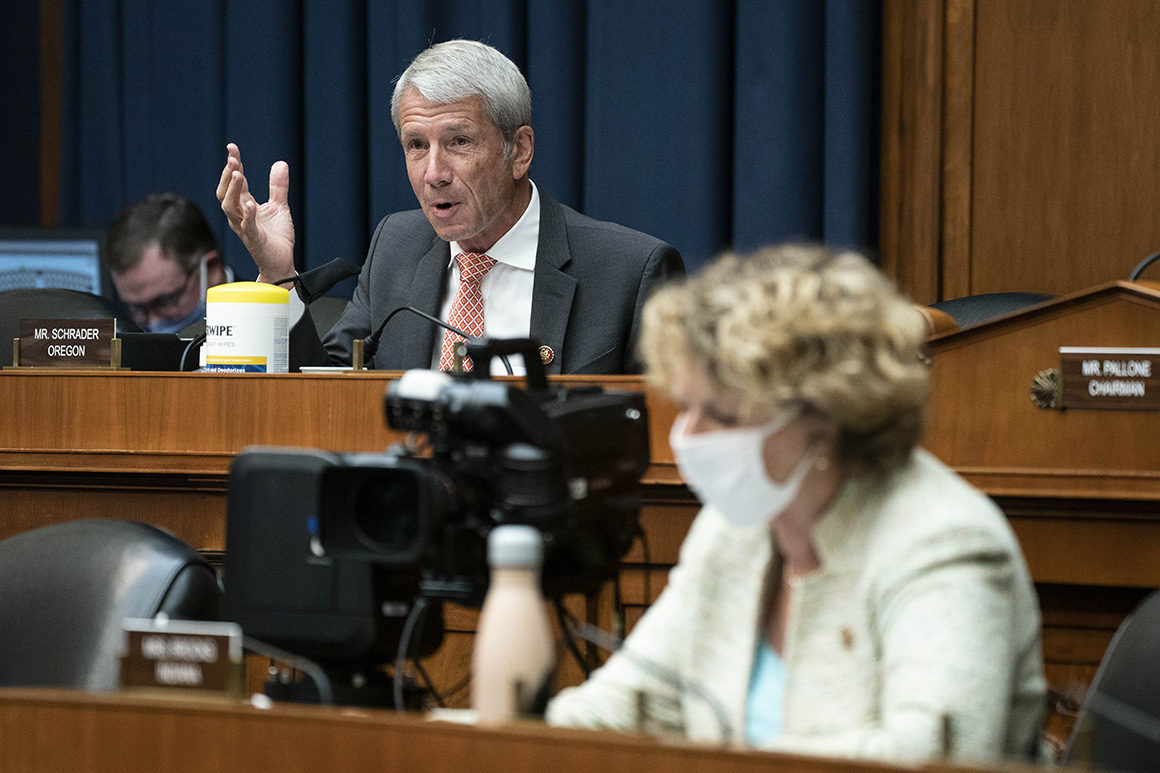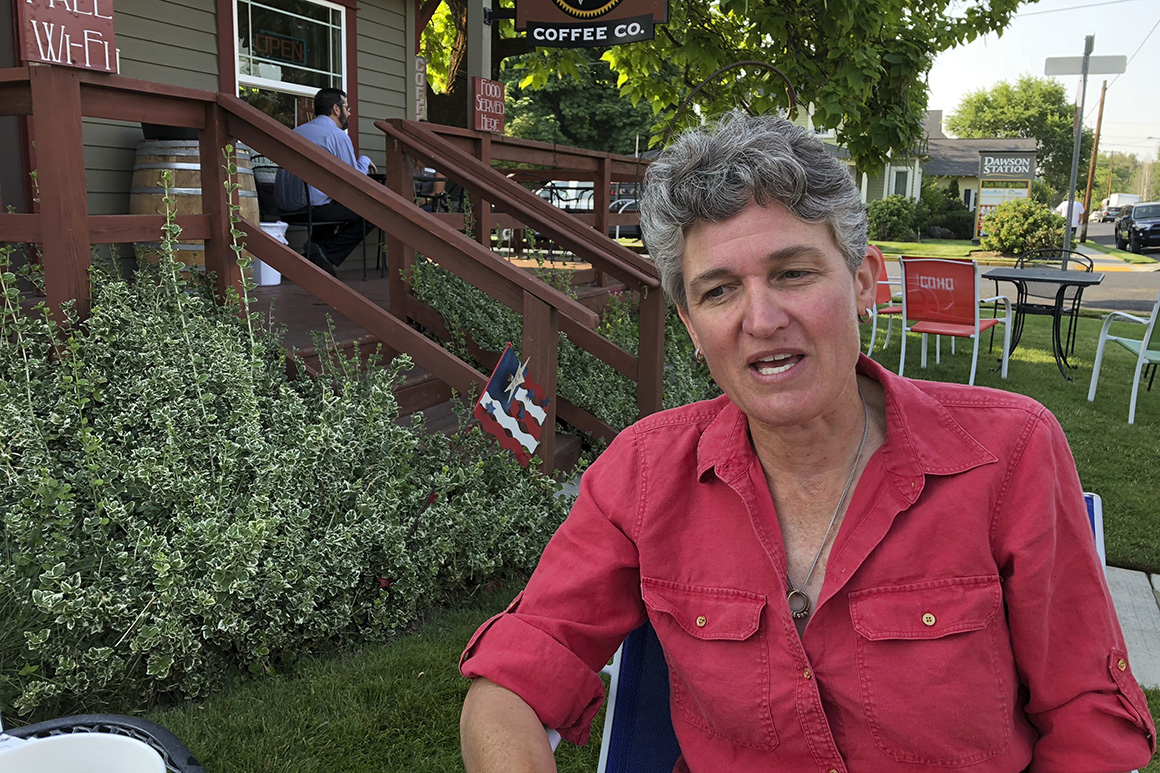
Progressives never loved moderate Rep. Kurt Schrader.
But it wasn’t until the last few years — when the Oregon Democrat likened the second impeachment of former President Donald Trump to a “lynching,” opposed a $15 minimum wage, and initially voted against the American Rescue Plan — that he truly surfaced on the radar of national left-wing activists.
Now top liberal groups and figures including Sen. Elizabeth Warren (Mass.), the Working Families Party and Indivisible are looking to oust the 13-year incumbent from Congress. They’ve lined up behind Jamie McLeod-Skinner, a school board member from central Oregon who’s challenging Schrader from the left, in what could become the next marquee Democratic House primary to watch.

After a year of bitter legislative feuds between progressives and moderate Democrats, the contest in Oregon’s 5th Congressional District is the latest example of high-profile liberal groups targeting centrists who they believe undermined President Joe Biden’s agenda. There are signs that McLeod-Skinner could have an opening: Her campaign has conducted an internal poll, first shared with POLITICO, that shows her trailing Schrader by only 3 percentage points. But in a race that will be judged as a test of the left’s strength, Schrader also has considerable advantages — chief among them, his enormous financial lead over McLeod-Skinner.
“Kurt Schrader has turned his back on what the majority of the American electorate needed and wanted, which is a functioning, competent government,” said Natalia Salgado, treasurer of the Working Families Party’s political action committee. “Progressives across the country are really looking and chomping at the bit to very much go after incumbents that are not reflective of the values that we espouse.”
The May 17 primary in Oregon comes as liberals are looking to mount a comeback after a series of losses across the country last year. In the first congressional races of 2022, which took place in Texas, the left saw mixed results. Toppling a centrist Democratic incumbent would be a significant morale boost for the progressive movement.
In a twist for liberals, who have made gains in recent years by challenging Democratic incumbents in deep-blue areas, the primary race in Oregon is for a newly-redrawn battleground seat — Schrader is on the Democratic Congressional Campaign Committee’s list of frontliners in competitive districts. Moderates are worried that McLeod-Skinner would lose a general election, and the race could attract outside spending by centrist Democratic groups looking to protect the seat.
“It’s a terrible idea. You couldn’t have picked a worse year to be putting an at-risk incumbent even more at-risk and putting a district out of reach if he loses the primary,” said Matt Bennett, co-founder of the center-left group Third Way. “A far-left candidate is not going to win a D+1 district.”
There is evidence of some dissatisfaction — and unfamiliarity — with Schrader among Democratic voters. About half of the redrawn district is new. McLeod-Skinner has been endorsed by four county Democratic Parties, including in Schrader’s home county of Clackamas. Two of the counties backing McLeod-Skinner are not currently represented by Schrader. Some local Democratic committee people who were just added to the district have said they don’t view Schrader as an incumbent.
A number of unions have also gotten behind McLeod-Skinner, including the Oregon Education Association, Service Employees International Union Oregon and United Food and Commercial Workers Union Local 555.
Schrader angered organized labor when he voted against the PRO Act, which would boost the rights of unions, in 2020. He later voted for the bill, though he said he would “take a close look at any changes made in the Senate before committing my vote” if it returned to the House for final passage.
“He was very much initially against the PRO Act until protesters had to demonstrate outside of his offices in Oregon City and in Salem,” said Michael Selvaggio, UFCW Local 555’s political director. “We’re not just looking for someone who can get to ‘yes.’ We’re looking for someone who comes in as a champion.”
Liberals have also targeted Schrader because they believe he helped tank Biden's “Build Back Better” agenda. Schrader was part of a group of moderate lawmakers who threatened to derail the Democrats’ budget last year unless the House first passed bipartisan infrastructure legislation — a strategy that progressives think helped kill Biden's social spending policy. Schrader voted against a piece of that plan that would have let the government negotiate prescription drug prices as well. He said his problem wasn’t with the pharmaceutical policy, but the size and process of the larger proposal.
In a statement, Schrader said his votes in the House prove that he supports organized labor and Biden’s priorities. As for his “lynching” comments, he quickly apologized at the time, saying “my words were wrong, hurtful and completely inappropriate.”
“My record shows I have voted with President Biden 96 percent of the time, including voting for the American Rescue Plan to support families, schools, and small businesses through the COVID-19 crisis, and the PRO Act to protect workers’ rights and strengthen unions,” said Schrader. “I’m also proud to have the backing of Planned Parenthood Action Fund, Joint Council of Teamsters No. 37, and Progressive Turnout Project, among others."
Both moderate and progressive Democratic strategists interviewed for this story said McLeod-Skinner is a serious primary challenger. Her campaign’s poll, which was conducted in early February by Patinkin Research Strategies, found 37 percent of likely Democratic primary voters backed Schrader and 34 percent supported McLeod-Skinner. Thirty percent were undecided.
But a major question hanging over McLeod-Skinner’s campaign is whether she will be able to compete financially with Schrader. He had $3.5 million on hand at the end of last year, according to his latest campaign finance report, compared to McLeod-Skinner’s $208,000.
Schrader has already used his war chest to beat McLeod-Skinner in the race to get on television. He began airing commercials in early March, which tout his background as a veterinarian and paint him as a fighter taking on pharmaceutical drug companies and big money in politics — getting ahead of McLeod-Skinner’s biggest criticisms of him.
“He brings such incredible baggage. … It’s everything from his vote against Medicare negotiating prescription drug prices. … It’s where he takes his money from, the Koch Industries and Big Pharma and fossil fuel,” McLeod-Skinner said in an interview. “All of these policies are things that people across the political spectrum care about.”
Schrader has the benefit of familiarity with left-wing challenges: He easily defeated Mark Gamba, mayor of Milwaukie and a Bernie Sanders supporter, in the 2020 Democratic primary. And he can point out that McLeod-Skinner does not live in the district.
“I’ve been proud to call Oregon’s 5th Congressional District my home for over 40 years,” Schrader said. “I raised my children and grew organic crops on my farm in Canby as I built my veterinary practice from scratch.”
Asked about the money gap between them, McLeod-Skinner said she is planning to raise $1 million for the primary and pointed out that she brought in $1.3 million in her previous race for Congress in 2018 in a different district. She lost that election in November to the Republican nominee, though she performed more strongly than the Democratic candidate in 2016.
Though she was ultimately unsuccessful in that race, as well as in a primary run for secretary of state in 2020, McLeod-Skinner’s supporters see in those results a path to victory for her this year. Every time she was on the ticket, she won Deschutes County, which is home to the liberal city of Bend and part of the new district.
“The second that folks saw what this district was going to look like as the legislature started passing maps, folks were like, 'Oh, this is Jamie's race,’” said Hannah Love, an Oregon-based Democratic strategist who is not working for either candidate in the primary. “People knew immediately that she was going to be a really formidable challenger for Schrader.”
Another Democratic consultant in Oregon disagreed with that analysis, arguing that the geography of the district is an advantage to Schrader because voters in Portland’s suburbs are moderate — and increasingly frustrated with progressive politics.
“There’s a lot of anger about the homelessness issue and safety issues in downtown,” said the person, who declined to be named. “And when you’re in the suburbs, that’s where folks are the most upset about it.”
----------------------------------------
By: Holly Otterbein
Title: Progressives find a new takedown target in the House
Sourced From: www.politico.com/news/2022/03/22/progressives-kurt-schrader-congress-oregon-primary-00019083
Published Date: Tue, 22 Mar 2022 03:30:00 EST
Did you miss our previous article...
https://consumernewsnetwork.com/politics-us/one-thing-thats-good-paul-thomas-andersons-messy-beautiful-music-videos






